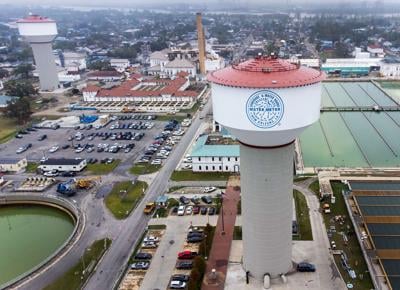With Gov. Jeff Landry, state lawmakers and city officials trying to come up with ways to “fix” the city’s broken sewerage and water systems, New Orleans stands at a pivotal, and precarious, moment.
Everyone from Landry to Sewerage & Water Board Executive Director Ghassan Korban agrees that significant reforms are needed. And in some areas, there’s broad consensus on the sorts of changes that will be necessary if S&WB is to fulfill its mission.
How those changes will be made and who will make them, however, is still very much up in the air.
Landry recently made it clear he has no interest in taking over S&WB — and thus owning all the troubled agency’s problems, particularly the likelihood that improvements will be slow in coming. The governor nonetheless appears intent on trying to fix, or at least meddle in, this peculiarly hybrid state and local institution. (S&WB was created by the state more than a century ago, but it is governed locally.)
Landry formed a task force to propose ways to right the S&WB ship. The task force recommended creating a new board — stacked with Landry allies — to run S&WB for two years.
Oh, if only S&WB’s problems could be solved in just two years.
Moreover, a state-dominated board would mean even less local oversight of S&WB, which is already trying to address its most pressing problem: its broken billing system.
There’s no functional rationale for shifting all authority over the S&WB to Baton Rouge. Many fear it would lead to privatization of our water system.
If current leadership were responsible for all or even most of the agency’s problems, such a move might make sense. But the sad truth is S&WB’s failures went unaddressed for decades before Korban arrived.
Whatever one might think of the current leadership, Korban and board members know the issues facing the S&WB, and there’s no indication Korban has lost the support of rank-and-file employees. With proper local and state support — including, perhaps, limited state oversight — Korban, the board and the New Orleans City Council would be well situated to implement needed reforms.
State support is critical. It may come with strings, perhaps even one or two state appointees to the board. It should not come at the expense of council oversight, however, particularly given the council’s new role as final arbiter of billing disputes.
Whatever lawmakers decide, S&WB management needs to fix the agency’s billing system. The current plan is to maintain the status quo until new “smart meters” are installed citywide — which, at best, won’t happen for at least two more years. That’s unacceptable. Ratepayers who already have smart meters, along with the council, should be able to know now, not two or more years from now, if the new billing system will work.
Getting S&WB’s billing system in order is the most crucial step towards restoring public confidence in the agency — and beginning the difficult task of fixing it.




